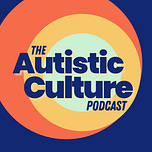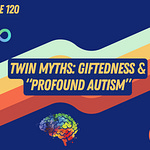An episode that sorts it all out.
Here’s what’s in store for today’s episode:
First, our hosts talk about executive functioning, how its inherent lack can negatively impact autistic individuals, and why implementing personalized organizational systems is essential to keeping your executive function manageable.
Autism is a dynamic disability influenced by many variables—our perception of things, how regulated we are, how much we have on our plate, and more. The more chaos we face, the less executive functioning we tend to have.
We discuss the autistic hell that is moving and how it can take up to a month of processing time to fully regain executive functioning afterward.
It’s crucial to have your own organized space to avoid emotional dysregulation. When things feel chaotic, it becomes harder to manage emotions and function effectively, but a structured environment provides the stability needed to stay grounded.
From scissor organizers to the perfect Command hook, discovering the right organizational tools is truly satisfying—but we first need to know they exist.
We talk about the organizational and autistic heaven that is IKEA — despite the occasional stress of assembling their furniture.
Our hosts discuss the lack of autophagy in autistic people and how it makes the use of behaviorism as the top treatment ironic, as it doesn’t benefit us in any meaningful way.
Matt and Angela discuss autism-specific ways of organizing items (by genre, by color, by whether your mug is a Star Wars mug or a Lego mug, et cetera), and how general neurotypical organizational methods don’t always benefit or serve us.
Anything that makes your life easier is essential to healthy autistic living—and crucial for preserving our spoons.
When we lose or misplace things as autistic people, our brains can become dysregulated and shift into survival mode—making organizational systems essential for us to maintain stability.
Matt and Angela also discuss solutions for long-term storage and the discomfort caused by shows like Storage Wars, which can create a sense of trauma around putting things into storage—making it feel like we’re abandoning our possessions.
If you can optimize your organizational systems now, it will save you stress, preserve your spoons, and protect your health and energy. It's an important investment in yourself.
“Autism is a dynamic disability, and it is based on all the stuff that happens - our dysregulation, our neurological perception of things, & how much stuff we’re going through at any given time. So the more chaos we have to do, the more variables we have to account for, the less executive functioning we’re going to have.” - Matt [paraphrased from original quote by Neurodiversely Unbroken]
“Organization, when you have it, is being in tune with the universe. With bottom-up processing, I picture the entire universe as being like clockwork, right? One variable impacts another variable impacts another variable. It’s the whole butterfly effect, right?” - Matt
“We are not a people known for our tolerance for ambiguity. We do not like the limbo. The limbo drains us because again, we’re constantly calculating the variables and trying to figure stuff out and trying to solve the problem in our brain, but it doesn’t reflect our environment. No matter how much we think about it, we actually have to get the energy to do it.” - Matt
“When I stress out and I can’t find something, I lose hours and hours. I struggle with time blindness. I miss appointments all the time, things I’m very excited about. And then all of a sudden I’ll look at the clock and two hours have gone by and I missed something that I was supposed to be doing. That happens when I lose things, when I can’t find things, when I’m dysregulated.” - Angela
“If you optimize every single room and make your life better, you will get spoons back. You will have fewer arguments with partners. You will have the energy to go out with a friend. You will have fewer stomach aches. There are ways that you can make your life better that are not that expensive. And that investment will pay back so many times.” - Angela
In this episode, we discuss the importance of organization for autistic people, exploring autism-specific organizational strategies, the challenges of executive functioning, and how personalized systems can make a huge difference in maintaining stability. Thanks for listening! Share your thoughts in the comments, and use #AutisticCultureCatch to connect with other listeners on social media. What resonated with you from this discussion? Let us know!
Related Shows:
Sunglasses Are Autistic
Follow us on Instagram
Find us on Apple Podcasts and Spotify
Learn more about Matt at Matt Lowry, LPP
Join Matt’s Autistic Connections Facebook Group
Learn more about Angela at AngelaKingdon.com
Angela’s social media: Twitter and TikTok
Our Autism-affirming merch shop















Share this post